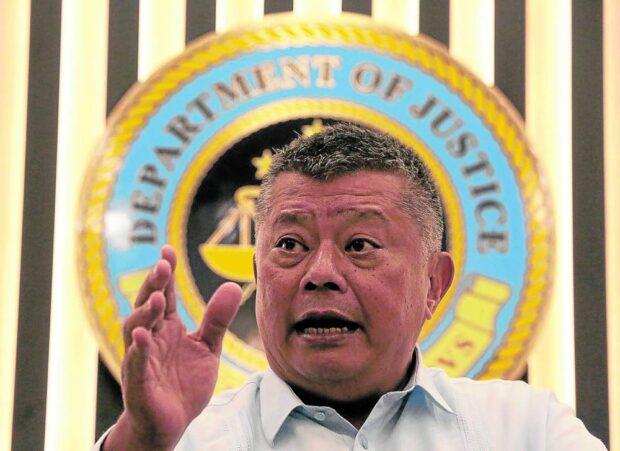
Justice Secretary Jesus Crispin Remulla. (INQUIRER FILE PHOTO)
MANILA, Philippines — The Department of Justice (DOJ) will maintain objectivity as a member of the Anti-Terrorism Council (ATC) and the National Task Force to End Local Communist Armed Conflict (NTF-Elcac).
Justice Secretary Jesus Crispin Remulla made the assurance on Wednesday during the hearing on the proposed 2024 budget of the DOJ.
He was reacting to ACT Teachers party-list Rep. France Castro who asked: “So the question is: as a member of NTF-ELCAC and ATC, how can the DOJ ensure the impartiality of the secretary itself, right?”
The implementing rules and regulations of the Anti-Terrorism Act of 2020 tasks the ATC with deploying plans and programs to fight terrorism. This includes tagging individuals and groups as terrorists.
On the other hand, the NTF-Elcac was created through an executive order issued in 2018 by then-President Rodrigo Duterte, with the goal of creating a whole-of-nation approach against the communist insurgency.
“The DOJ has to be objective in what it does. Partiality is a point of view that many of us may have different definitions of because we are partial to victims of crimes. If that is the only thing that we have to do, we have to state that we are very partial to victims of crimes,” Remulla said.
“But we are very objective in what we do as to the culpability of people. We will not bring anybody to court without any evidence that will back up our claim,” he added.
Castro then brought up the case of Reina Mae Nasino, an activist arrested in Manila in November 2019 and charged with illegal possession of firearms and explosives. She was also accused of supporting communist rebels.
The DOJ filed a against Nasino and two others. But Judge John Benedict Medina, who presides over Branch 47 of the Manila Regional Trial Court, dismissed the case due to conflicting testimonies of witnesses — two police officers and a barangay chief.
After that, various groups called for better scrutiny of cases, along with consideration of humanitarian concerns, as Nasino had a baby, who got sick and died, while she was still in jail.
According to Castro, if the DOJ had been impartial — and partial only to the victims — the case should have not prospered at the prosecutor level.
“If you are saying that you are partial to the victims, may I know why the case was not dismissed on the level of the prosecutor? And you know Reina Nasino’s child died and she was incarcerated for three years when the case against her cannot be proven,” Castro said in a mix of English and Filipino.
But Remulla said the DOJ under his leadership was not behind the filing of that case — as it happened during the previous administration. Nevertheless, he assured Castro that prosecutors would only file complaints in winnable cases.
“Madam Chair, we cannot win all the cases — and these cases were filed prior to our coming into the DOJ. And we just have to roll with the punches. We cannot win all the cases that are filed by the prosecutors, but we can assure everybody that our standard of looking at the cases is much higher now. And we are demanding much more from the prosecutors before they file cases,” Remulla said.
“That is something that has to be done to actually solve many problems including the congestion of our jail systems.”
Drug war data
Castro also questioned Remulla about why more drug suspects were killed during President Ferdinand Marcos Jr.’s first year in office than during the administration of Rodrigo Duterte just a year before.
Citing data from the Philippine National Police (PNP), Castro said that, from June 30, 2021, to June 29, 2022 – when Dutere was still the president — there were 302 drug war-related killings. It jumped to 342 deaths under Marcos, from June 30, 2022 to June 30, 2023.
The total figure, Castro said, is broken down as follows:
- 160 drug suspects killed by state agents
- 42 killed by non-state agents
- 105 unidentified
- 35 unknown
Remulla said the DOJ would have to validate the data first. He added that Castro should be objective too as other killings should not be automatically placed as done by state agents.
“With that problem, we don’t know where it came from — the data that we are talking about. We cannot say that the drug-related deaths are true because what’s important is we should validate the data first,” Remulla said.
“So if you are saying that these are drug-related killings Mr. Chair, it’s hard to say so because when unknown persons are behind it, why do they imply that state agents are behind it, or label it as killings under Marcos? It seems to be politics, I hope we will be more objective,” he added.
“That’s not the case, of course. The killings happened during his term […] that’s why we are able to compare it, Mr. Secretary, last year under Duterte and now, based on the PNP data,” Castro said.
The drug war is one of the major issues hurled at the Duterte administration with over 6,200 individuals killed in police operations in six years.
At the start of his term, Marcos promised that the drug war would now take on a different approach — with consideration for the rights of suspects.